The Week That Was: DC Trident Dominates ISL Play-In Match; Matt Sates Takes Down World Junior Records
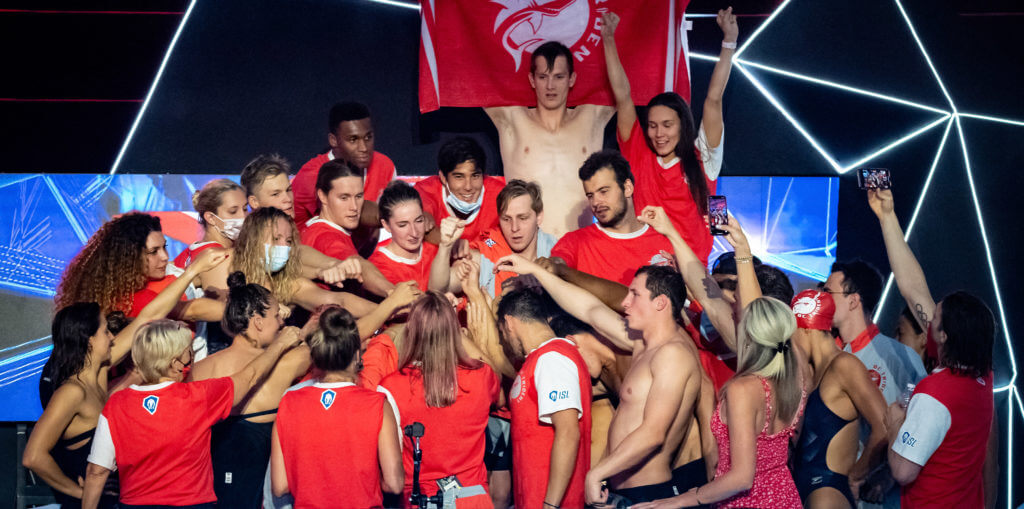
The Week That Was sponsored by Suitmate.
This week, the ISL regular season finished up with the play-in match, as the DC Trident and Team Iron booked their tickets to the eight-team playoffs, scheduled for three weeks in November. Additionally, the FINA World Cup kicked off with South African teenager Matt Sates posting some very impressive efforts, and there was news in the United States regarding Claire Curzan and Mike Unger.
Read the five biggest stories of the week in The Week That Was sponsored by Suitmate.
The Week That Was #1: DC Trident and Team Iron Heading to ISL Playoffs After Play-In Match
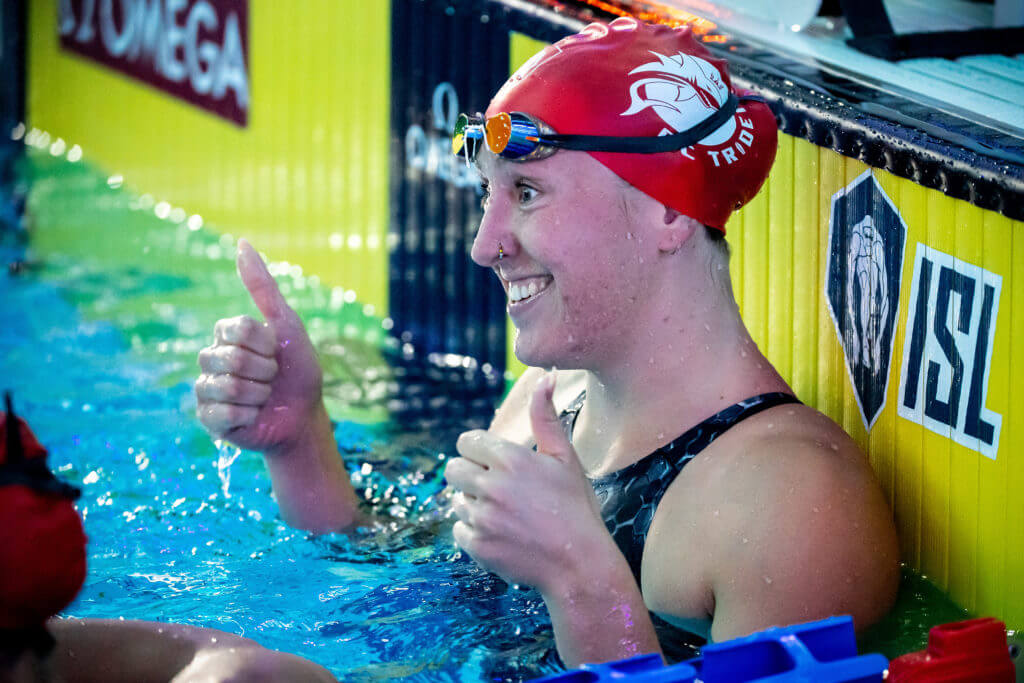
DC Trident’s Bailey Trident — Photo Courtesy: Giorgio Scala / Deepbluemedia / Insidefoto
By Dan D’Addona
In the third season of the International Swimming League (ISL), the final match of the regular season featured a play-in with the teams sitting seventh through 10th in the standings – Team Iron, Tokyo Frog Kings, DC Trident and New York Breakers – battle it out to see who will join the top six in the playoffs in November.
After the two-day meet, it was the DC Trident that surged to victory, led by a huge jackpot victory by Bailey Andison. Other DC winners at the match included Aleksandr Shchegolev, Ryan Hoffer, Andreas Vazaios, Ali DeLoof, Mark Nikolaev and Joanna Evans. Meanwhile, Team Iron finished second, just five points behind the Trident, thanks to some quality skins racing, and a pair of wins from Ranomi Kromowidjojo, and that secured Iron’s spots in the ISL playoffs, set for November in Eindhoven.
#2: Matt Sates Sets Two World Junior Records at FINA World Cup in Berlin
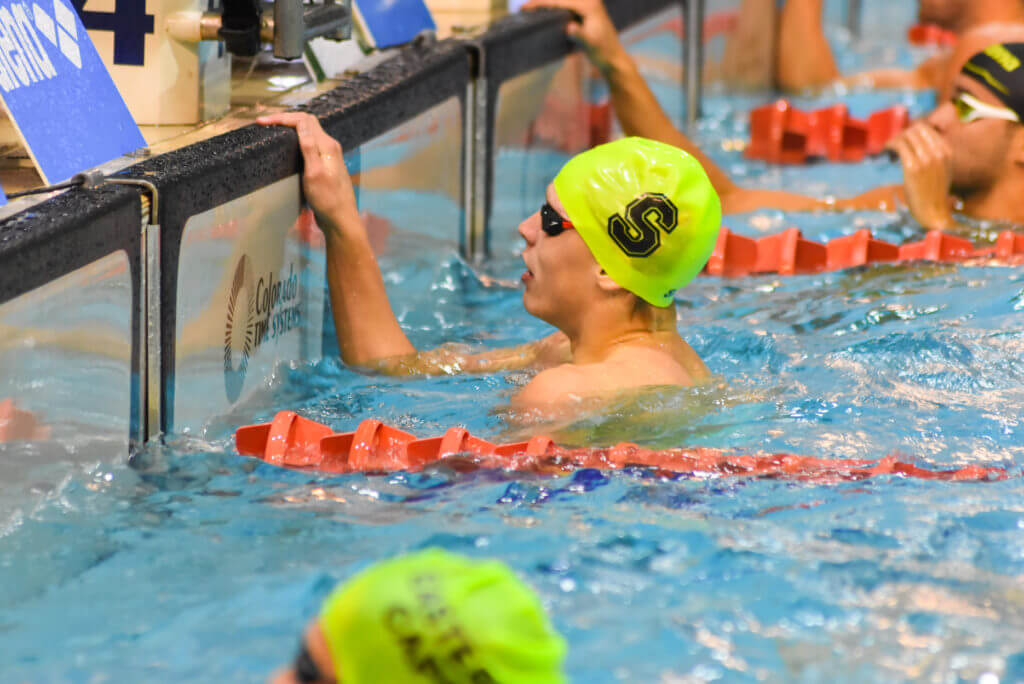
Matt Sates — Photo Courtesy: Swimming South Africa
By Liz Byrnes and Matthew De George
Day one: Kira Toussaint set a World Cup 50 back record and Kyle Chalmers and Emma McKeon made it an Australian double in their respective 50 free races on day 1 in Berlin.
Toussaint’s time of 25.81 was 0.21 outside her own world record of 25.60 as she led home Canadian pair Maggie MacNeil – a butterfly specialist – and Kylie Masse were second and third respectively. MacNeil went 25.84 for a Canadian record and Masse – the Tokyo 2020 two-time silver medallist – touched in 25.96 as all three women went inside 26secs.
Chalmers had qualified quickest for the final of the 50 freestyle in 21.18 and he came through on the second 25 of the final to take the touch in 21.01. Szebasztian Szabo of Hungary was second in 21.09 with Jesse Puts of the Netherlands and Russia’s Vlad Morozov sharing third in 21.15.
McKeon won the women’s race in 23.56 ahead of Sweden’s Michelle Coleman (23.88) with Madison Wilson ensuring an Australian one-three in 24.04.
Day two: South Africa’s Matt Sates turned in a time of 1:51.45 in the men’s 200 individual medley at the FINA World Cup stop in Berlin Saturday. The time is a national record and a world junior record for the 18-year-old.
Sates’ time cut more than a second off the world junior record set by Daiya Seto in 2012 at 1:52.48. It also undercut by a tenth of a second that 12-year-old South African record of Darian Townsend from 2009. Sates’ time is the eighth-fastest in history.
Sates won the race by more than 2.5 seconds, ahead of Lithuania’s Danas Rapsys on Day 2 of the three-day meet, the first stop of four this season in the FINA World Cup. Sates won the 100 IM on Friday to go with second in the 400 free.
Madi Wilson continued her recovery from COVID-19, the Australian who has been excellent in ISL this season going 1:54.00 to claim the 200 free. She led from the 100 wall on to best Katja Fain of Slovenia by .38 seconds.
Day three: Matthew Sates set a world junior record and African mark as he went 1:40.65 over 200 free at the FINA World Cup in Berlin.
The South African had completed a clean sweep of the IM events with victory over 400 in the opening race of the evening before returning 70 minutes later for the 200.
Not only was it a WJR but also a continental mark, lowering Darian Townsend‘s time of 1:40.89 from November 2009 – coincidentally at the Berlin stop of the World Cup.
It sliced 1.10secs off the previous WJR of 1:41.75 set by Kliment Kolesnikov in December 2018 and was his second record in as many days following the 200IM.
There was also a world junior record of 1:41.55 by the United States in the 4×50 mixed medley relay.
Arno Kamminga and Christian Diener completed clean sweeps of the breaststroke and backstroke events respectively and Emma McKeon added the 100 free to her 50 title in a PB of 50.96.
The Week That Was #3: Tokyo Olympian Claire Curzan Announces Verbal Commitment to Swim at Stanford
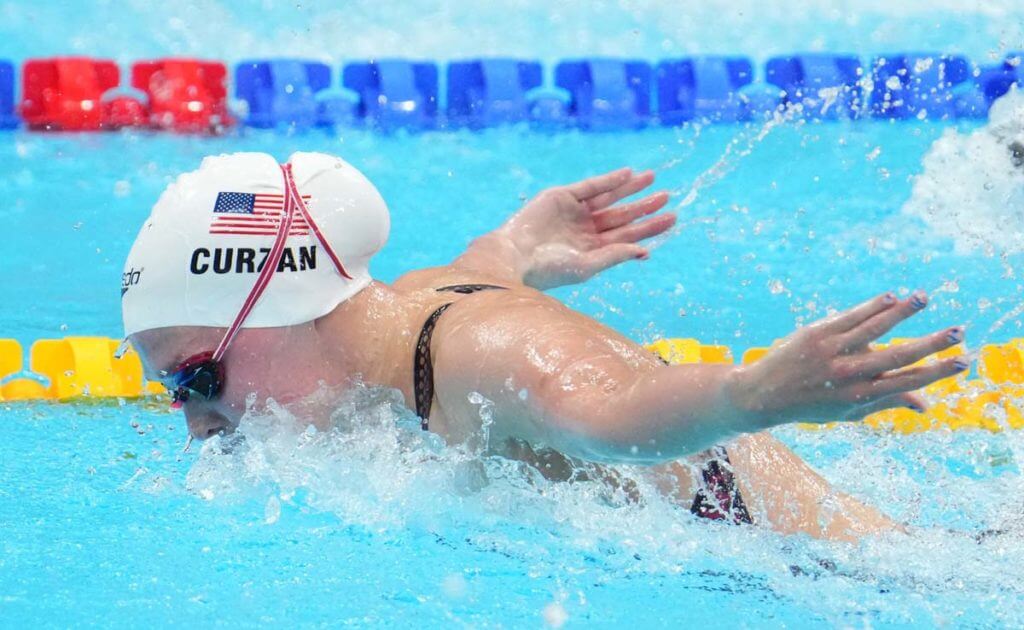
Claire Curzan — Photo Courtesy: Rob Schumacher/USA Today Sports
The No. 1 recruit in the Class of 2022 has made her college decision: Tokyo Olympic semifinalist and U.S. National Teamer Claire Curzan has announced her verbal commitment to Stanford. She will join a group that includes two of her teammates from the U.S. Olympic team, Regan Smith and fellow 100 butterflyer Torri Huske.
Curzan will provide a huge boost to coach Greg Meehan’s group that is looking to get back on top of the national rankings after winning three straight NCAA titles in 2017, 2018 and 2019. The Cardinal ended up ninth at the 2021 championships but figure to vault back up the rankings even this year before Curzan arrives in September 2022.
Curzan is coming off a phenomenal summer where she finished 10th in the semifinals of the 100 butterfly at the 2020 Olympic Games in Tokyo. She also swam the fly leg during prelims of the 400 medley relay, helping Team USA secure a spot in finals to go on to earn the silver medal.
In an Instagram post announcing her decision, Curzan said, “I am thrilled to finally announce my verbal commitment to continue my academic and athletic career at Stanford University! I could not of done this without my amazing coaches, teammates, and educators, and the endless support from my family and friends. I’m truly blessed and can’t wait to join the farm!!”
A native of Cary, North Carolina, she earned her Olympic berth after finishing second in the 100 butterfly at Trials in Omaha, where she also advanced to the semifinals of the 50 and 100 freestyle.
#4: USA Swimming COO Mike Unger Departing Organization; Heading to FINA as Director of Sports Competition

Mike Unger — Photo Courtesy: Taylor Brien
By David Rieder
Swimming World has learned from multiple sources that Mike Unger will be leaving USA Swimming.
Since 1993, Unger has been a consistent presence in the USA Swimming organization, and for more than a decade, Unger has been the No. 2 figure with the organization, first behind Chuck Wielgus and for the last five year’s as Tim Hinchey’s chief lieutenant. But Unger is now headed to work for FINA as its Director of Sports Competition. Swimming World has learned that Unger’s final day at USA Swimming before he begins his new globally-focused role will be December 31.
Unger’s current title is Chief Operating Officer, and before that, he was the Assistant Executive Director and the interim Executive Director, stepping into the leadership role when Wielgus was battling cancer and then after Wielgus passed away in April 2017. Unger was considered a candidate for the permanent lead job that eventually went to Hinchey, but he remained with the organization and served as a key figure in the leadup to the delayed Tokyo Olympics.
While at USA Swimming, Unger has also worked as National Events Director, Marketing Director and National Team Coordinator, and he oversaw all major USA Swimming-hosted events, including the Olympic Trials, Nationals, Golden Goggles, the Duel in the Pool and, in 2014, the Pan Pacific Championships. He has played a role in just about every department at USA Swimming at some point during his long tenure with the organization.
Under Unger’s leadership, USA Swimming has elevated its Olympic Trials from a 4,000-seat arena at the IUPUI Natatorium in 2000 to a 10,000-seat temporary venue in a Long Beach, Calif., parking lot in 2008 to the major sporting event that it now is. Four straight Trials have been held inside an Omaha, Neb., basketball arena that can seat around 14,000 fans when set up for swimming, and Unger has been among those whose efforts have helped grow the sport and put on an event of such significance.
Unger has also been involved in all major swimming telecasts since the 1996 Olympics. He has typically sat in the production truck, and he has been a voice in the ear for commentators Dan Hicks and Rowdy Gaines for seven Olympics (Atlanta 1996, Sydney 2000, Athens 2004, Beijing 2008, London 2012, Rio 2016, Tokyo 2020). He has also helped out the production efforts for domestic and collegiate swimming telecasts.
The Week That Was #5: Virginia and Stanford Women Post Impressive Performances to Open College Swimming Season
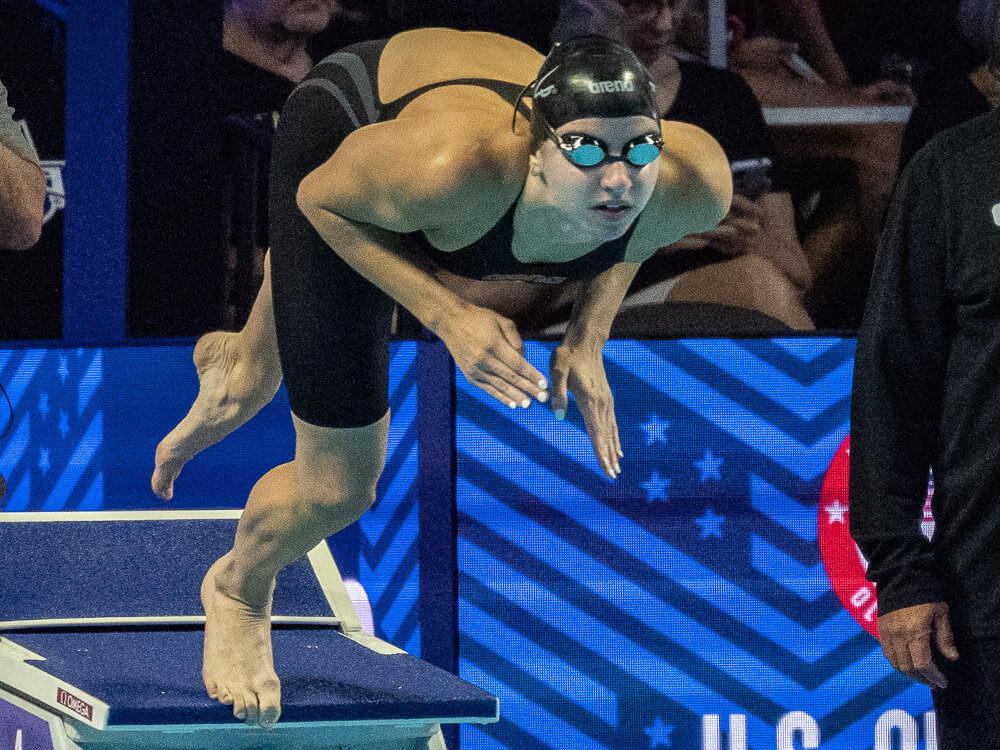
By David Rieder
Virginia Intrasquad: With the calendar having shifted to October, college dual meet action is on its way back, and the University of Virginia kicked off its season with a Saturday morning intrasquad that featured some recognized events (the 50 freestyle and 100 IM) but also 50s and 150s of each stroke, a 300 and 600 free and a 300 IM. Virginia’s women are returning the bulk of a squad that won its first-ever NCAA team title last season while adding in two new stars, while the Cavalier men have a lot to build on following last year’s return to the top 10 in the ninth spot.
The most impressive swimmer at the intrasquad was Kate Douglass, who finished first in four individual events but most notably swam a 21.48 in the 50 free. That is just four tenths off her lifetime best of 21.09, which she swam to win last year’s NCAA title and ranks No. 3 all-time in the event. Douglass, the bronze medalist in the 200 IM at her first Olympics this summer, also won the 150 free (1:14.99), the 150 fly (1:21.98) and 50 fly (22.56). Before any of her individual races, Douglass also anchored the Third Years’ winning 200 mixed medley relay in 20.90.
Finishing one spot ahead of Douglass in that Olympic final was her Virginia teammate Alex Walsh. Walsh won the 300 IM in 3:00.90, finished second in the 50 breast and then won the 150 breast in 1:33.45. Finally, she faced off with new UVA teammate and younger sister Gretchen Walsh in the 100 IM and came out on top, 53.08 to 53.54.
The younger Walsh is sure to be a favorite in the sprint events this year at the ACC level and even at the national level, and she started out with a 20.95 anchor split on the mixed medley relay before winning the 50 back (23.86) and placing second to Douglass in the 50 free (21.63). Walsh’s best time in the 50 free sits at 21.41, ranked 13th all-time.
The third U.S. Olympian now competing for Virginia is Emma Weyant, who remained at home in Sarasota, Florida, during what would have been her first year in Charlottesville. After winning a silver medal in the 400 IM in Tokyo, Weyant began this campaign by winning the 600 free (5:45.49) and 300 free (2:45.78) and placing second to Walsh in the 300 IM.
Stanford women defeat San Jose State: At last season’s women’s NCAA championships, Stanford placed ninth after capturing the last three national championships (in 2017, 2018 and 2019). But the Cardinal will bring a much-improved team into competition this year, by no means the clear title favorite as in those previous years when stars like Katie Ledecky, Simone Manuel and Ella Eastin were leading the way, but at least a group in the conversation for the top spot.
This year, Stanford has Taylor Ruck, a four-time Olympic medalist on relays, an Olympic finalist this year in the 200 back and a gold medalist at the 2018 Pan Pacific Championships, returning to the team after a two-year Olympic hiatus. Regan Smith is beginning her college career after a one-year deferral prompted by the COVID-19 pandemic after she captured her first three Olympic medals this summer in Tokyo. And Torri Huske has arrived on the Farm after her Olympic debut, giving Stanford two of the best freshman swimmers in the country to lead the way.
And in the team’s first meet of the season, a home dual meet against San Jose State, the trio of Ruck, Smith and Huske captured two victories apiece. Ruck won the 100 back (53.94) and 100 fly (53.57), while Smith won the 200 fly (1:57.34) and 200 IM (2:00.69) while swimming the butterfly leg with teammates Lucie Nordmann, Zoe Bartel and Anya Goeders on Stanford’s first-place 200 medley relay team (1:41.12). Meanwhile, Huske placed first in the 50 free (22.58), 500 free (4:51.33) and on the 400 free relay with fellow freshman Anna Shaw, Aurora Roghair and Amy Tang (3:24.17).
Stanford’s top performer last season, fifth-year senior Brooke Forde, finished second to Smith in the 200 fly (1:59.52) and also won the 200 breast (2:14.40). Forde was also at the Olympics this summer, repreenting the United States in the 800 freestyle relay and capturing a silver medal.



